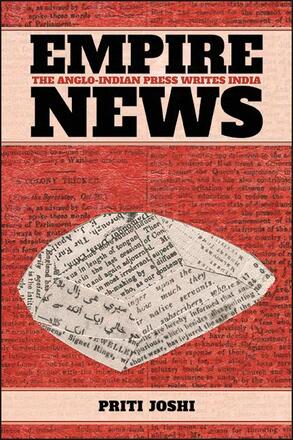
Empire News
The Anglo-Indian Press Writes India
Alternative formats available from:
Examines English-language Indian newspapers from the mid-nineteenth century and their role in simultaneously sustaining and probing British colonial governance.
Description
Shortlisted for the 2022 George A. and Jeanne S. DeLong Book History Book Prize presented by the Society for the History of Authorship, Reading and Publishing
Winner of the 2021 Robert and Vineta Colby Scholarly Book Prize presented by the Research Society for Victorian Periodicals
In Empire News, Priti Joshi examines the neglected archive of English-language newspapers from India to unpack the maintenance and tensions of empire. Focusing on the period between 1845 and 1860, she analyzes circulation—of newspapers and news, of peoples and ideas—and newspapers' coverage and management of crises. The book explores three moments of colonial crisis. The sensational trial of East India Company vs. Jyoti Prasad in Agra in 1851 as the Kohinoor diamond is exhibited in London's Hyde Park is a case lost but for colonial newspapers. In these accounts, the trial raises the specter of Warren Hastings and the costs of empire. The Uprising of 1857 was a geopolitical crisis, but for the Indian news media it was a story simultaneously of circulation and blockage, of contraction and expansion, of colonial media confronting its limits and innovating. Finally, Joshi traces circuits of exchange between Britain and India and across media platforms, including Dickens's Household Words, where the empire's mofussil (margin) appears in an unrecognized guise during and after the Uprising. By attending to these fascinating accounts in the Anglo-Indian press, Joshi illuminates the circulation and reproduction of colonial narratives and informs our understanding of the functioning of empire.
Priti Joshi is Professor of English at the University of Puget Sound.
Reviews
"…a finely detailed study of news circulation in provincial and regional spaces during key periods of change and crisis, the latter not least exemplified by the chaos that engulfed India during the Indian insurgency and uprising of 1857. Information during this period became valuable currency, and Joshi draws our attention to the multiple movements of news from colony to metropole and the circulation of material within regional settings." — Victorian Studies
"If we are to have histories of journalism that are both inclusive and extensive, narrated beyond the confines of individual countries, then we need many more books of this type and scope … This is a project clearly driven by passion, and it is clear how it has benefited from the additional energies, let alone stamina, that such an emotional investment brings. Disarmingly chatty in style, lifting the tone of the volume from what could have been a dusty slog through the archives, the text is further enlivened by personal vignettes from various archival sources that illustrate the complexities of writer and lawyer John Lang and his projects." — Library & Information History
"Empire News will be required reading for scholars researching Victorian imperialism. Those interested in media and book studies and empire studies will find its discussion of the press networks of Anglo-India especially rewarding. This book is an important bridge between postcolonial studies and Victorian studies, two fields that have long had many missed connections. Furthermore, it is an excellent model for how to present a long-neglected archive to an audience unfamiliar with the materials." — Nasser Mufti, author of Civilizing War: Imperial Politics and the Poetics of National Rupture
"An impressive and original project." — Catherine Waters, author of Commodity Culture in Dickens's "Household Words": The Social Life of Goods